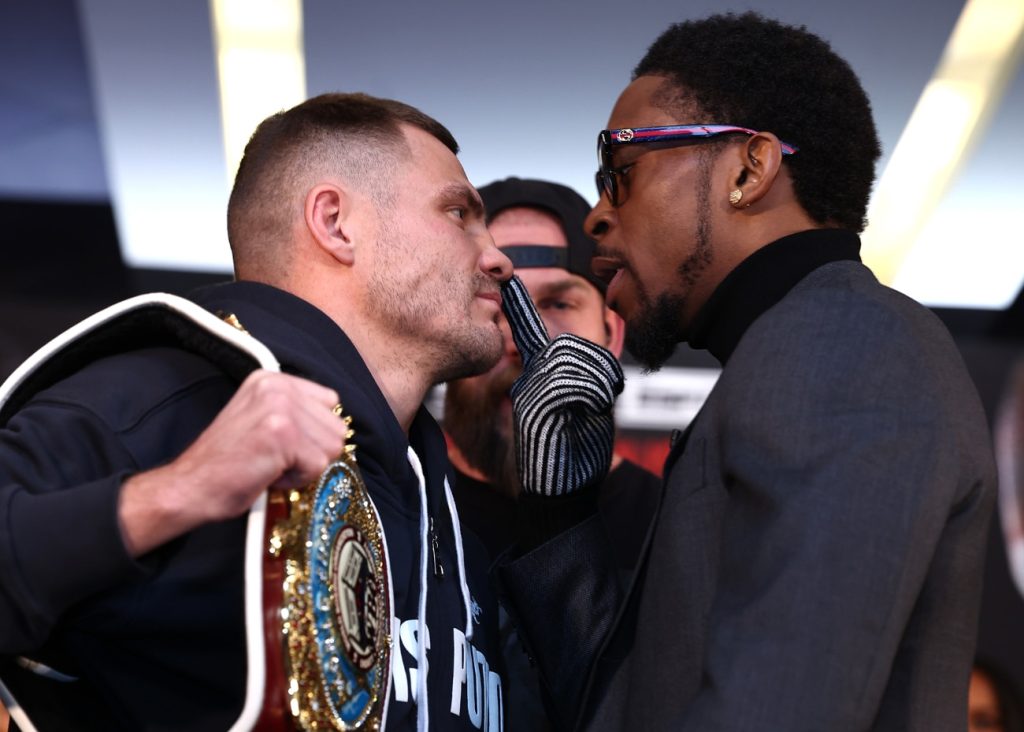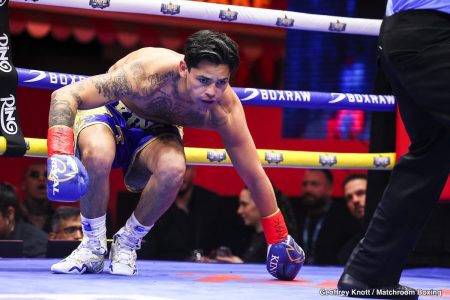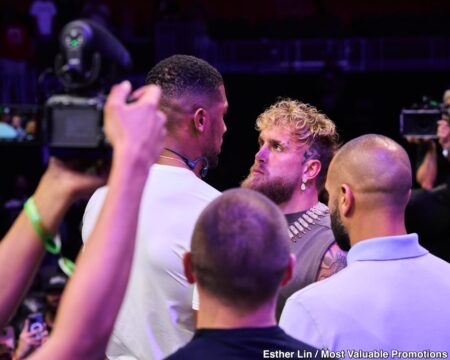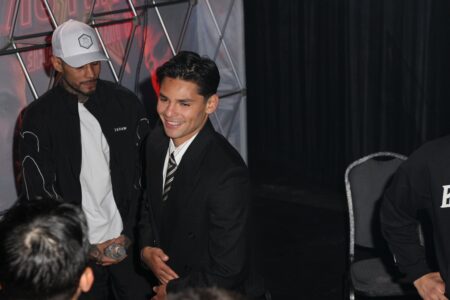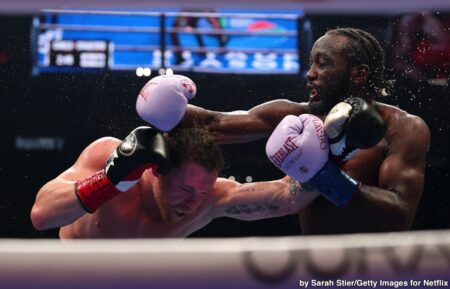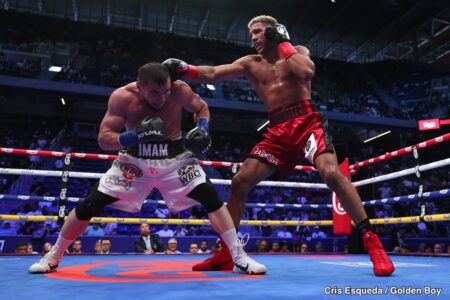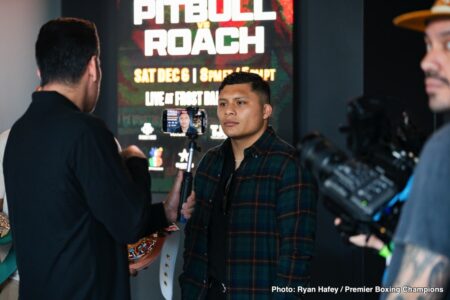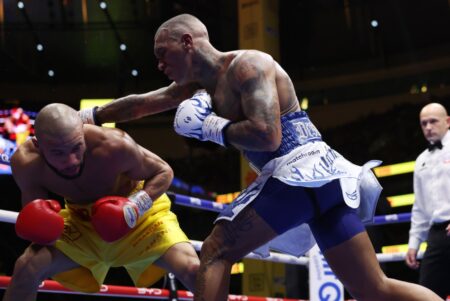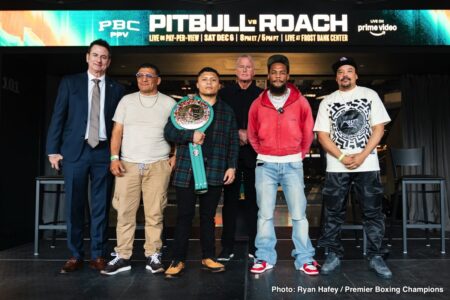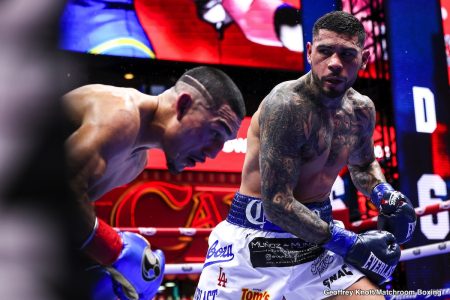The Push That Cost Berinchyk 20%
Keyshawn Davis, a dynamic and outspoken fighter, has made headlines for more reasons than just his skills in the ring. During the face-off after the weigh-in for their upcoming fight at Madison Square Garden Theater in New York City, WBO lightweight champion Denys Berinchyk (19-0, 9 KOs) allegedly pushed Davis, a gesture that has now resulted in a significant financial boost for the latter. According to Davis, the push means he will receive an additional 20% of his original purse, a substantial amount that he plans to use to purchase another house to rent out. Initially, he intended to buy two homes with his earnings, but now, thanks to Berinchyk’s impulsive action, he’s on track to acquire three. While the additional money is undoubtedly a positive outcome for Davis, it raises questions about the fairness and professionalism of such arrangements.
The Pre-Fight Press Conference: Verbal Abuse and Controversy
The tension between the two fighters has been palpable throughout the build-up to the fight, but it reached a boiling point during the final press conference. Davis, who had received an anonymous box of bananas and watermelons in his hotel room, repeatedly called Berinchyk a "racist" without any concrete proof of the source. This verbal assault was not just unprofessional; it was deeply hurtful and could have been avoided. Someone from Top Rank, the promotional company, should have stepped in to diffuse the situation and remind Davis of the consequences of making unfounded racial allegations. Despite the lack of evidence, Davis’s words had a significant impact, and it was unfair to Berinchyk, who was verbally abused in front of a large audience.
Davis’s Apology and Its Conditions
In a surprising turn of events, Davis took to social media to apologize to Berinchyk and his team for the racial comments. He stated, “My bad, Berinchyk team, and I was going to say that today until he pushed me.” Davis admitted that he was “calmed down now” and no longer “tripping on that s*** for real,” but the apology came with a caveat. He explained that he was prevented from confronting Berinchyk physically by security, which he found frustrating. While Davis’s apology is a step in the right direction, it does little to mitigate the emotional and reputational damage already done to Berinchyk. The situation highlights the need for better control and management in pre-fight events to prevent such escalations.
The Role of Promotions and Social Media
Davis also addressed a video posted by former lightweight champion Teofimo Lopez on Twitter, which he believes was a promotional stunt. He acknowledged Lopez’s savvy promotion skills but reiterated that he has no interest in fighting him, labeling Lopez as “racist” once again. However, the authenticity of Davis’s stance on not fighting Lopez is questionable. If a fight against Lopez, one of the biggest names in boxing, were offered, it’s likely that Davis would jump at the opportunity, given the potential financial windfall. The conflict between verbal sparring and the business side of boxing is evident, and such statements often serve more as promotional tactics than genuine feelings.
The Financial Impact and Future Plans
The 20% increase in Davis’s purse is a substantial sum, especially considering that Berinchyk was already set to earn more than Gustavo Lemos, Davis’s previous opponent. Davis’s financial success at 12-0 (soon to be 13-0) is impressive, and with this additional money, he plans to invest in real estate. His goal to buy three houses to rent out shows a savvy approach to managing his earnings, which is crucial in a career as unpredictable as boxing. However, the method of obtaining this extra money—through a physical altercation—raises ethical concerns. The financial implications of such actions can be significant, and it’s a reminder that the stakes in boxing are not just about the fight itself but also about the behavior and reputation of the fighters.
The Fight Ahead and Davis’s Intentions
Looking forward to the fight, Davis is confident and determined. He claims that he no longer wants to knock out Berinchyk in the first round but instead plans to “keep beating on him each round.” Davis’s aggressive strategy is clear, and he even anticipates a “no mas” (no more) moment, where Berinchyk might choose to stop the fight. Given Berinchyk’s Ukrainian background, Davis suggests that he will have to say “no mas” for him, adding a layer of cultural and linguistic tension. Davis’s focus and determination are admirable, but his comments about Berinchyk’s potential surrender are a bit presumptuous. The fight at Madison Square Garden will be a test of both fighters’ skills and resilience, and it’s essential to respect the opponent, especially in such a high-stakes event.
In conclusion, while Keyshawn Davis’s extra 20% purse is a significant financial gain, the circumstances surrounding it are controversial and raise important questions about the behavior and professionalism of fighters outside the ring. The pre-fight press conference and the push on stage have added layers of tension and drama to an already highly anticipated fight. As the bout approaches, both fighters must focus on their preparations and ensure that their conduct remains respectful and professional, regardless of the provocations.

